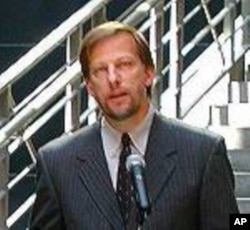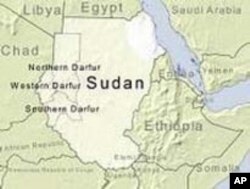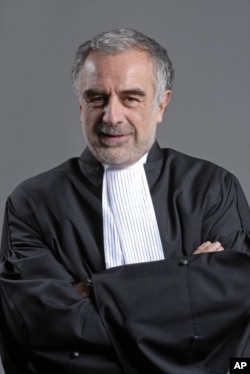Reactions to Wednesday’s International Criminal Court (ICC) appeal of genocide charges against Sudan’s President Omar Hassan al-Bashir range from a broadside against the U.S. government by Sudan’s foreign ministry, to measured comments from members of the American anti-genocide community.
In Khartoum, foreign ministry spokesman Ambassador Mu’awiya Uthman Khalid blamed Washington for slowing the peace process by sending “negative signals at all times.” He singled out the Save Darfur alliance of American anti-genocide organizations, which he accused of directly hampering the peace process.
In Washington, the president of the largest organization in the alliance, Jerry Fowler of the Save Darfur Coalition, said that Wednesday’s ruling rectifies legal errors that will provide hope to Darfur victims and rebel groups, but will not likely alter the pace of current peace talks in Doha, Qatar or influence the conduct of April presidential elections in Sudan.
“For victims of attacks in Darfur, most of whom believe that they are victims of genocide, it gets a reconsideration of that particular charge. I think in the broader scheme of things, it underscores, though, that regardless of the ultimate outcome on this charge, President Bashir remains a fugitive internationally, and his ability to travel is very limited, and the prospects that he will ultimately face justice continue to be strong,” said Fowler.
Last March, Sudan’s President became the first sitting head of state to be indicted by the International Criminal Court. In their original ruling, the judges of the ICC’s Pre-Trial Chamber issued an arrest warrant against Mr. Bashir for a total of five counts of war crimes and crimes against humanity, but the panel threw out charges of genocide that had also been requested by Prosecutor Luis Moreno-Ocampo.
Justices said last year that there were insufficient grounds to charge the president with genocide. Save Darfur’s Jerry Fowler says that Prosecutor Moreno-Ocampo advanced his appeal of that ruling on Wednesday by convincing the appeals panel that President Bashir should be held accountable for masterminding a campaign of rape, murder, and other crimes against civilians in Darfur.
“The statute of the International Criminal Court is pretty clear in saying that at the arrest warrant stage, you just have to establish a reasonable basis that the crime was committed. And the Pre-Trial Chamber kind of twisted that standard, and they basically insisted that the only reasonable inference from the evidence would be genocide, which made it that the Prosecutor had to show beyond a reasonable doubt. And I think what the Appeals Chamber did was put it back into perspective that at this stage, you have to establish a reasonable basis to believe that the crime was committed,” he explained.
If President Bashir goes on to face trial, Fowler suggests, that is when the standard of proving genocide charges beyond a reasonable doubt will apply. Moreno-Ocampo indicated after Wednesday’s ruling that he would seek permission to furnish additional evidence of what he calls Mr. Bashir’s “genocidal intention.”
The Prosecutor indicated that last year’s eviction of international humanitarian groups from Sudan following the issue of the arrest warrant could constitute part of his new submission.
African countries ranging from neighboring Uganda, to South Africa, Nigeria, and Ghana have told Sudan’s president that as nations abiding by governing ICC statutes, they would have to honor an international arrest warrant if he travels to their territories. Mr. Bashir is visiting Doha, Qatar this week to take part in peace talks between Sudanese government officials and members of selected Darfur rebel groups. Qatar and other countries visited by President Bashir during the past year are not parties to the ICC, and are not under legal obligations to arrest him.
Toward Monday’s close of the African Union summit in Addis Ababa, Ethiopia, delegates drafted a resolution voicing the A.U.’s regret that the U.N. Security Council has not called on the Criminal Court to have all charges dropped against the Sudanese president. Since last year, the A.U. has rejected the Bashir indictments on grounds that they would upset peace efforts in Darfur and in southern Sudan. But Save Darfur’s Fowler says that the evidence does not bear out that argument.
“The experience of the last year and a half since the Prosecutor first requested the arrest warrant, which happened in July of 2008, is that it’s not affecting peace negotiations. They’re being driven by their own political dynamics, and in fact, peace negotiations picked up steam after the Prosecutor first requested the arrest warrants. So to that extent, they seem to have a positive impact,” he argued.
Following the March, 2009 ICC indictments, President Bashir’s eviction of dozens of humanitarian NGO’s alarmed western governments concerned about the violence in Darfur and the displaced civilians of southern Sudan. Fowler says that the Obama administration and other governments need to make it clear that the international community will not tolerate a similar expulsion in retaliation for the genocide charges being considered against Sudan’s president.
“I certainly hope that they don’t retaliate, and I think that it’s very important that the United States government and other governments make clear that a retaliation is unacceptable. For the danger that civilians were put into by the expulsions last year was averted only by the heroic efforts by the United Nations and by aid agencies that were left behind. And even now, the civilians are much more vulnerable than they were. So it’s very important that the United States and African governments and other governments make clear to President Bashir that further endangering civilians will not be tolerated,” he said.
The International Criminal Court at the Hague is an independent judicial institution with judges from all over the world. It operates by statute that is signed onto more than 110 countries, including 31 African countries.







